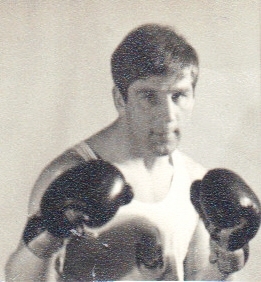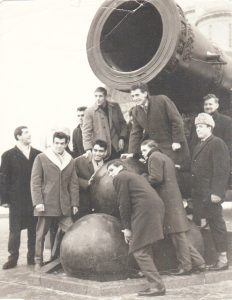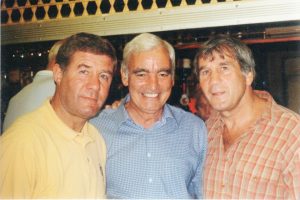
Tasty Young Amateur
Ronnie Smith fought as right-handed southpaw whose love of boxing kept him hooked for over half a century. A prolific amateur throughout the sixties, he boxed for London eight times, the first of which took him to Uganda. He also represented England eight times, including appearances in Russia, West Germany and Italy. As Ronnie grew from light-welter to light-middle, he won the North West London divisional championships five times in a row and the London finals twice. There were a tough bunch of contemporaries on the prowl at the time, including Bunny Sterling, Howard Sharpe and Mark Rowe, all of whom he beat, although Mark Rowe repaid the compliment in their next fight, which turned out to be Ronnie’s last. At the age of 25, he became a trainer at St Pancras ABC, where he remained for 45 years and produced a string of champions.
Ronnie was born in Kentish Town in 1942. “I was a war baby. There were a lot of derelict houses all over the show because Kentish Town got hit quite hard, and they wanted to take all the children away, but my mum said ‘No, we’re all staying.’ I came from a family of seven children and I was the youngest. I had two brothers, but they didn’t box. As I kid, I used to collect pictures of all the boxers, especially Randolph Turpin. He was my idol and, every time Randolph boxed, I stayed up to hear him on the radio. So my interest in boxing went from there.”
“My brother-in-law lived up Hampstead, so he took me to Hampstead Boxing Club. It was only a bus ride of three stops up the road. Mind you, I used to walk there, as it happens, and walk back home again with my bag. So I joined Hampstead when I was ten years old, I started boxing when I was 11, and I boxed for them all the way through. Charlie Webster was my first trainer there, but he went into the pub game and became a landlord. After that, Danny Hallett took over, and he was my trainer all the way through my career. I had quite a few junior bouts. I ended up a Class C champion, which is just before you become a senior, at 17, and I boxed in the ABAs from the following year onwards.”
“I boxed as a southpaw, but the funny thing was I shouldn’t have been a southpaw really. Although I was right-handed, when I started, I used to lead with my right, and I boxed like that for so long that it was too late for me to turn round. If I’d have been changed round as a junior, I think I would have had a good right cross. I could have thrown it with my shoulder behind it, put my weight behind it. But I had a good right hook, I must admit. That’s what I caught a lot of people with, the right hook.”
“There were so many good fighters around in my day. One time, I had five fights in one day at welterweight in the North West London divisional ABA championship, which obviously wouldn’t be allowed nowadays. That was when they had four rings going at the same time at the Stanmore Arena. That was the year when I stopped Larry O’Connell in the semis. Being a southpaw, I caught him with a right hook and it was a lucky punch. Larry went down and, when he got up, he walked into a neutral post thinking he was going back to the corner. The referee waved it off, because Larry didn’t know where he was. But, after it was stopped, Larry was saying ‘I shouldn’t have been stopped.’ To be honest, it probably shouldn’t have been stopped. It could have carried on if he’d moved away and put his hands up. If he’d have done that, he probably would have been all right. Anyway, later on in life, when Larry became a referee, he came over to me and he said ‘Ron, I’ve got to admit that it was right that our fight was stopped.’ All the way through, Larry and I have always got on well, and it was fantastic for him to say that to me after all that time.”
“That was my first year that I went right through to the national ABA final, and I boxed Brian Brazier. I think Brian didn’t expect me to produce what I did on that night, and I thought the bout was quite even. It could have gone either way. But I must admit, when I had a match with him a year later, he stopped me on a cut eye. I think he trained a bit harder that time. But I’m not taking anything away from Brian, because he was a very good boxer.”
“The first time I went abroad to box was for London against Uganda, and I won over there. I was the first winner out of our team and, after that, all the other London boys went on to win. It was a terrific place, really beautiful, and they treated us well. They put us in a top hotel. But, to be honest, I felt a bit out of place really, because I felt uncomfortable with the hospitality they gave us. It was like they gave us too much. When we were touring, we saw the people were living in mud huts and straw huts, and things like that.”

England Team in Red Square, Moscow – Ronnie’s hand is on Larry O’Connell’s shoulder.
The following year, Ronnie travelled to Moscow where, wearing an England vest, he had his hardest fight that he can remember. “My first international was against the Russians, and I was the only winner out in Moscow. The hotel where we were staying was in Red Square, and we had a lovely tour of the country. It was December and it was snowing, but we all took our overcoats with us so that was okay. I think the toughest fight I ever had was against the Russian in Russia, because I got my nose broken. I came out of the ring and, when you’ve got a broken nose, you know you’ve been in a fight.”
“I boxed for London against West Germany twice, once in Hannover and once at the Albert Hall. The one against the West German in England, I can’t remember what round it was, but I put him down twice anyway. I well won it, and the verdict went the other way. Everybody booed and booed, and they all stood up. They ripped their programmes up and threw them in the ring, and there was so much commotion over it that they re-checked the score cards, and one of the judges had the red and blue corners mixed up. So they called me back in the ring and the verdict went the other way. So I won that one, but I was going to pack up boxing altogether after that. I got a lot of close decisions, but I’m not having a go at anyone. When I fought Tom Imrie at England versus Scotland, that one could have gone either way. I lost on points in Italy, against Rome, and I thought I was robbed there.”
“In 1965, I beat Mark Rowe in the London Finals, and then I got through to the national finals and I boxed Pat Dwyer. I think those two were the hardest of all the British fellas that I boxed. When I fought Pat Dwyer, we’d both stopped our boys in the semis in the second round, I think it was, so it was always going to be a punch-up, and that’s how it was. We never moved from the middle of the ring. He ended up getting the verdict. It was very close, but I never complained about it, and the audience enjoyed it anyway.”
“In the North West divisionals the next year, I beat Bunny Sterling and Howard Sharpe, and both of them were outstanding fighters. Then I got beat by Mark Rowe in the London finals. So I ended up fighting Mark twice in the last two years of my boxing career, and both of them were hard fights. After the second fight with Mark, that was it for me. I’d been at the top over a period of about six years, and nobody backed off from you because you represented England. They all wanted to beat you and get a name for themselves. To tell you the truth, I got a little bit tired of it. I was having a bit of trouble with my nose from when I got it broke in Moscow, and I’d just had enough.”
Ronnie never had aspirations of turning professional. “To tell you the truth, I was happy with what I was doing. I was a glazier by trade, and I was earning pretty good money. I was only 25, and I became a trainer. In those days, you had to complete a GLC course, and I took that course and I become a trainer at St Pancras. I think they were short of trainers in those days, and I just wanted to pass something on, give a bit of knowledge back to the game. So I was lucky to be around at the right time, and I stayed at St Pancras for 45 years.”
“I always liked the training side of it. When I was boxing, I used to run over Parliament Hill Fields on Saturday and Sunday every week. So, when I became a trainer, I used to take all the boys over there, and we had quite a few boys coming through the running track, right over the back, across the country, and it was beautiful. When you come back after a run and you have a shower, you feel so refreshed and so relaxed. When I was fighting for England, I used to get up at about half past 6 and do the outer circle around Regent’s Park every morning before I went to work. So I was always fit as a fiddle. My fitness was my main weapon really. I would say that I was definitely an aggressive fighter. I tried to do a bit of boxing, but it wasn’t me. I used to hook all the time and body punch. I was a good body puncher. Well, I think I was a good body puncher anyway!”
“I enjoyed my time as a trainer at St Pancras, and I had some nice boys that I looked after, like Jim McDonnell [Commonwealth silver medalist] and Mickey Hughes [Olympian at Los Angeles]. They were both ABA champions, and so was David Dent, and one of the most experienced ones out of the lot of them was Herman Henry. I’ve had schoolboy champions, Federation of Boys’ Club champions, junior and senior ABA champions, and England reps.”
“My proudest moments were when my boys won the ABAs and represented England. That was quite a good achievement. The thing was, I always made sure that they got matched up in bouts they could handle, and they weren’t over-classed. I made sure that their first bout for England was an even bout. It wasn’t against a Russian, like my one. So that’s what I passed on, my knowledge of representing London and England. With most of the boys I trained, they got to a certain level, the level I got to, and then they turned pro. Quite a few of them stay in touch. I still see Jimmy McDonnell now and again. Funnily enough, Herman Henry phoned me up about three days ago because he’s heard I’ve got the old Parkinson’s disease. He said ‘Look, we must have a meet and have a meal.’ I still see Micky Hughes and David Dent. I still see a lot of them.”
“To tell you the truth, I honestly don’t know how many amateur fights I had, but I won the majority of them. I went to some great places, and I had some great fights with some great people. I think our elite amateurs today get looked after very well. I think we got £1.25 a day spending money and, if you had to have time off work, you never got paid. But I just wanted to represent London and my country, I had a lovely time, and I really enjoyed my whole amateur career.”

Mark Rowe, Larry O’Connell and Ronnie Smith.
Love Ronnie. Excellent trainer, and fighter before that.
I still see Ronnie occasionally in the Holloway Road.
Sorry to know that he he’s been diagnosed and being treated for Parkinson’s.
A great guy, and I’ll never forget the times I trained with him.